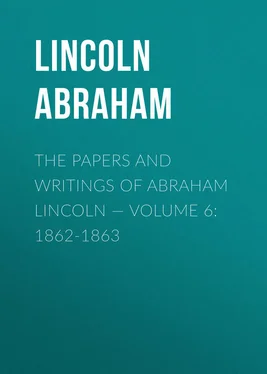Abraham Lincoln - The Papers And Writings Of Abraham Lincoln — Volume 6 - 1862-1863
Здесь есть возможность читать онлайн «Abraham Lincoln - The Papers And Writings Of Abraham Lincoln — Volume 6 - 1862-1863» — ознакомительный отрывок электронной книги совершенно бесплатно, а после прочтения отрывка купить полную версию. В некоторых случаях можно слушать аудио, скачать через торрент в формате fb2 и присутствует краткое содержание. Жанр: foreign_antique, foreign_prose, на английском языке. Описание произведения, (предисловие) а так же отзывы посетителей доступны на портале библиотеки ЛибКат.
- Название:The Papers And Writings Of Abraham Lincoln — Volume 6: 1862-1863
- Автор:
- Жанр:
- Год:неизвестен
- ISBN:нет данных
- Рейтинг книги:3 / 5. Голосов: 1
-
Избранное:Добавить в избранное
- Отзывы:
-
Ваша оценка:
- 60
- 1
- 2
- 3
- 4
- 5
The Papers And Writings Of Abraham Lincoln — Volume 6: 1862-1863: краткое содержание, описание и аннотация
Предлагаем к чтению аннотацию, описание, краткое содержание или предисловие (зависит от того, что написал сам автор книги «The Papers And Writings Of Abraham Lincoln — Volume 6: 1862-1863»). Если вы не нашли необходимую информацию о книге — напишите в комментариях, мы постараемся отыскать её.
The Papers And Writings Of Abraham Lincoln — Volume 6: 1862-1863 — читать онлайн ознакомительный отрывок
Ниже представлен текст книги, разбитый по страницам. Система сохранения места последней прочитанной страницы, позволяет с удобством читать онлайн бесплатно книгу «The Papers And Writings Of Abraham Lincoln — Volume 6: 1862-1863», без необходимости каждый раз заново искать на чём Вы остановились. Поставьте закладку, и сможете в любой момент перейти на страницу, на которой закончили чтение.
Интервал:
Закладка:
Already I have given you discretion to occupy Mount Jackson instead, if, on full consideration, you think best. I do not believe Jackson will attack you, but certainly he cannot attack you by surprise; and if he comes upon you in superior force, you have but to notify us, fall back cautiously, and Banks will join you in due time. But while we know not whether Jackson will move at all, or by what route, we cannot safely put you and Banks both on the Strasburg line, and leave no force on the Front Royal line — the very line upon which he prosecuted his late raid. The true policy is to place one of you on one line and the other on the other in such positions that you can unite once you actually find Jackson moving upon it. And this is precisely what we are doing. This protects that part of our frontier, so to speak, and liberates McDowell to go to the assistance of McClellan. I have arranged this, and am very unwilling to have it deranged. While you have only asked for Sigel, I have spoken only of Banks, and this because Sigel's force is now the principal part of Bank's force.
About transferring General Schenck's commands, the purchase of supplies, and the promotion and appointment of officers, mentioned in your letter, I will consult with the Secretary of War to-morrow.
Yours truly,
A. LINCOLN.
TO GENERAL J. C. FREMONT
MAJOR-GENERAL FREMONT, Mount Jackson, Virginia:
Your despatch of yesterday, reminding me of a supposed understanding that I would furnish you a corps of 35,000 men, and asking of me the "fulfilment of this understanding," is received. I am ready to come to a fair settlement of accounts with you on the fulfilment of understandings.
Early in March last, when I assigned you to the command of the Mountain Department, I did tell you I would give you all the force I could, and that I hoped to make it reach 35,000. You at the same time told me that within a reasonable time you would seize the railroad at or east of Knoxville, Tenn., if you could. There was then in the department a force supposed to be 25,000, the exact number as well known to you as to me. After looking about two or three days, you called and distinctly told me that if I would add the Blenker division to the force already in the department, you would undertake the job. The Blenker division contained 10,000, and at the expense of great dissatisfaction to General McClellan I took it from his army and gave it to you. My promise was literally fulfilled. I have given you all I could, and I have given you very nearly, if not quite, 35,000.
Now for yours. On the 23d of May, largely over two months afterward, you were at Franklin, Va., not within 300 miles of Knoxville, nor within 80 miles of any part of the railroad east of it, and not moving forward, but telegraphing here that you could not move for lack of everything. Now, do not misunderstand me. I do not say you have not done all you could. I presume you met unexpected difficulties; and I beg you to believe that as surely as you have done your best, so have I. I have not the power now to fill up your Corps to 35,000. I am not demanding of you to do the work of 35,000. I am only asking of you to stand cautiously on the defensive, get your force in order, and give such protection as you can to the valley of the Shenandoah and to western Virginia.
Have you received the orders, and will you act upon them?
A. LINCOLN.
TO GENERAL C. SCHURZ
BRIGADIER-GENERAL SCHURZ, Mount Jackson, Virginia:
Your long letter is received. The information you give is valuable. You say it is fortunate that Fremont did not intercept Jackson; that Jackson had the superior force, and would have overwhelmed him. If this is so, how happened it that Fremont fairly fought and routed him on the 8th? Or is the account that he did fight and rout him false and fabricated? Both General Fremont and you speak of Jackson having beaten Shields. By our accounts he did not beat Shields. He had no engagement with Shields. He did meet and drive back with disaster about 2000 of Shields's advance till they were met by an additional brigade of Shields's, when Jackson himself turned and retreated. Shields himself and more than half his force were not nearer than twenty miles to any of it.
A. LINCOLN.
TELEGRAM TO GENERAL H. W. HALLECK
MAJOR-GENERAL HALLECK, Corinth, Mississippi:
It would be of both interest and value to us here to know how the expedition toward East Tennessee is progressing, if in your judgment you can give us the information with safety.
A. LINCOLN.
TELEGRAM TO GENERAL G. B. McCLELLAN
MAJOR-GENERAL McCLELLAN:
Yours of to-day, making it probable that Jackson has been reinforced by about 10,000 from Richmond, is corroborated by a despatch from General King at Fredericksburg, saying a Frenchman, just arrived from Richmond by way of Gordonsville, met 10,000 to 15,000 passing through the latter place to join Jackson.
If this is true, it is as good as a reinforcement to you of an equal force. I could better dispose of things if I could know about what day you can attack Richmond, and would be glad to be informed, if you think you can inform me with safety.
A. LINCOLN.
TELEGRAM TO GENERAL G. B. McCLELLAN
MAJOR-GENERAL McCLELLAN:
Yours of last night just received, and for which I thank you.
If large reinforcements are going from Richmond to Jackson, it proves one of two things: either they are very strong at Richmond, or do not mean to defend the place desperately.
On reflection, I do not see how reinforcements from Richmond to Jackson could be in Gordonsville, as reported by the Frenchman and your deserters. Have not all been sent to deceive?
A. LINCOLN.
TELEGRAM TO GENERAL G. B. McCLELLAN
MAJOR-GENERAL McCLELLAN:
In regard to the contemplated execution of Captains Spriggs and Triplett the government has no information whatever, but will inquire and advise you.
A. LINCOLN.
TELEGRAM TO GENERAL G. B. McCLELLAN
MAJOR-GENERAL McCLELLAN:
We have this morning sent you a despatch of General Sigel corroborative of the proposition that Jackson is being reinforced from Richmond. This may be reality, and yet may only be contrivance for deception, and to determine which is perplexing. If we knew it was not true, we could send you some more force; but as the case stands we do not think we safely can. Still, we will watch the signs and do so if possible.
In regard to a contemplated execution of Captains Spriggs and Triplett the government has no information whatever, but will inquire and advise you.
A. LINCOLN.
TELEGRAM TO GENERAL G. B. McCLELLAN
MAJOR-GENERAL GEORGE B. McCLELLAN:
Your despatch of yesterday (2 P. M.) was received this morning. If it would not divert too much of your time and attention from the army under your immediate command, I would be glad to have your views as to the present state of military affairs throughout the whole country, as you say you would be glad to give them. I would rather it should be by letter than by telegraph, because of the better chance of secrecy. As to the numbers and positions of the troops not under your command in Virginia and elsewhere, even if I could do it with accuracy, which I cannot, I would rather not transmit either by telegraph or by letter, because of the chances of its reaching the enemy. I would be very glad to talk with you, but you cannot leave your camp, and I cannot well leave here.
Читать дальшеИнтервал:
Закладка:
Похожие книги на «The Papers And Writings Of Abraham Lincoln — Volume 6: 1862-1863»
Представляем Вашему вниманию похожие книги на «The Papers And Writings Of Abraham Lincoln — Volume 6: 1862-1863» списком для выбора. Мы отобрали схожую по названию и смыслу литературу в надежде предоставить читателям больше вариантов отыскать новые, интересные, ещё непрочитанные произведения.
Обсуждение, отзывы о книге «The Papers And Writings Of Abraham Lincoln — Volume 6: 1862-1863» и просто собственные мнения читателей. Оставьте ваши комментарии, напишите, что Вы думаете о произведении, его смысле или главных героях. Укажите что конкретно понравилось, а что нет, и почему Вы так считаете.












